Welcoming the new year of 2024 with enthusiasm, Oracle Integration is primed to unveil an array of exciting updates and enhancements in the expansive realm of connectivity. Within this blog, we will unravel the latest features, emphasizing groundbreaking additions and improvements that promise to elevate your integration experience. Join us on this innovation journey as we explore the dawn of the new year, where connectivity meets cutting-edge technology.
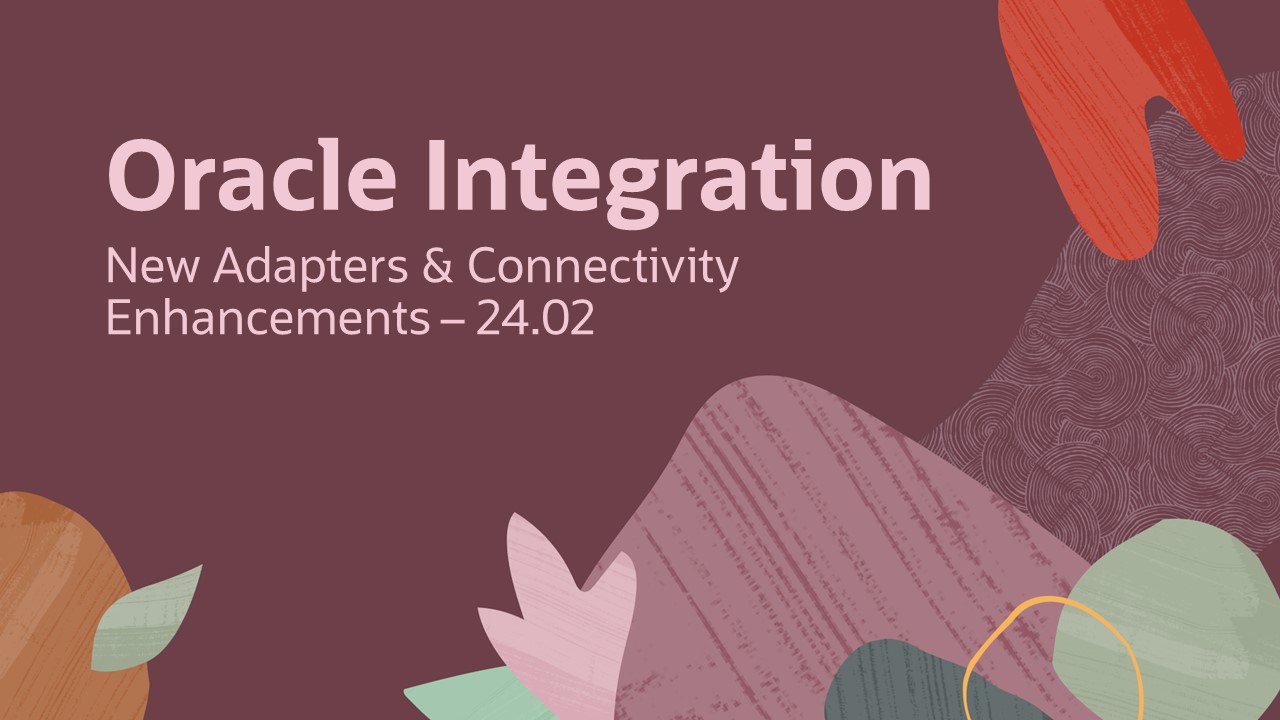
Here’s a glimpse of the enhancements that will be showcased:
- Rapid Adapter Builder – Framework to develop the adapters on your own
- Coupa Adapter – New adapter
- Salesforce Rest Adapter – New adapter
- SAP SuccessFactors Adapter Enhancements – Multi-navigation, pagination, and query parameter support
- Snowflake Adapter Enhancements – Internal stage, running SQL statements, and performing operations against tables support
- Azure Storage Adapter Enhancement – Blob deletion option support
- GCP Pub Sub Adapter Enhancement – AVRO schema support
- Azure Event Grid Adapter Enhancement – Payload and Avro schema message structure support
- Azure Service Bus Adapter Enhancement – Cloud support
- HubSpot Adapter Enhancement – Inbound support
- OData Adapter Enhancements – Multilevel navigation for modification operations support
- Azure Active Directory Enhancements – Subscribing to user and group events, and automatic webhook renewal support
- Private endpoint enablement for multiple adapters
- Apache Kafka Adapter and Confluent Adapter enhancements – Streaming API support
- FTP Adapter enhancement – ECdsa and EDdsa PGP keys support
- Oracle Eloqua Cloud Adapter enhancement – Updating multiple matched records support
Rapid Adapter Builder – New Framework to Develop Your Own Adapters
The Rapid Adapter Builder transforms the building of adapters in Oracle Integration. The Rapid Adapter Builder framework allows you to build adapters effortlessly against third-party applications that expose REST APIs, without having to develop complex code, through use of the Visual Studio code extension. It simplifies custom adapter development in Oracle Integration and facilitates incremental development of adapters, including the syntactic and semantic validation of the code developed.
The Rapid Adapter Builder provides the following features:
- Enables customers/partners with minimal technical knowledge to build adapters without much coding.
- Builds adapters rapidly, ensuring a seamless experience to develop and publish the adapter.
- Opens up the opportunity to build the adapters by customer, partner, or independent software vendor (ISVs).
- Reduces the dependency on only Oracle to develop the adapters.
- Provides a comprehensive partnership program for partners to monetize.
Quick steps to build an adapter
To build an adapter using the Rapid Adapter Builder framework, start by creating a postman collection or an Open API document using an application’s APIs. Using the Visual Studio Code extension of the Rapid Adapter Builder, a postman collection/Open API document can be converted into an Adapter definition document (ADD). The ADD can be modified as per customer needs and published to the OIC Integration Store as an adapter. You can also perform the incremental development of an adapter as per the new requirements.
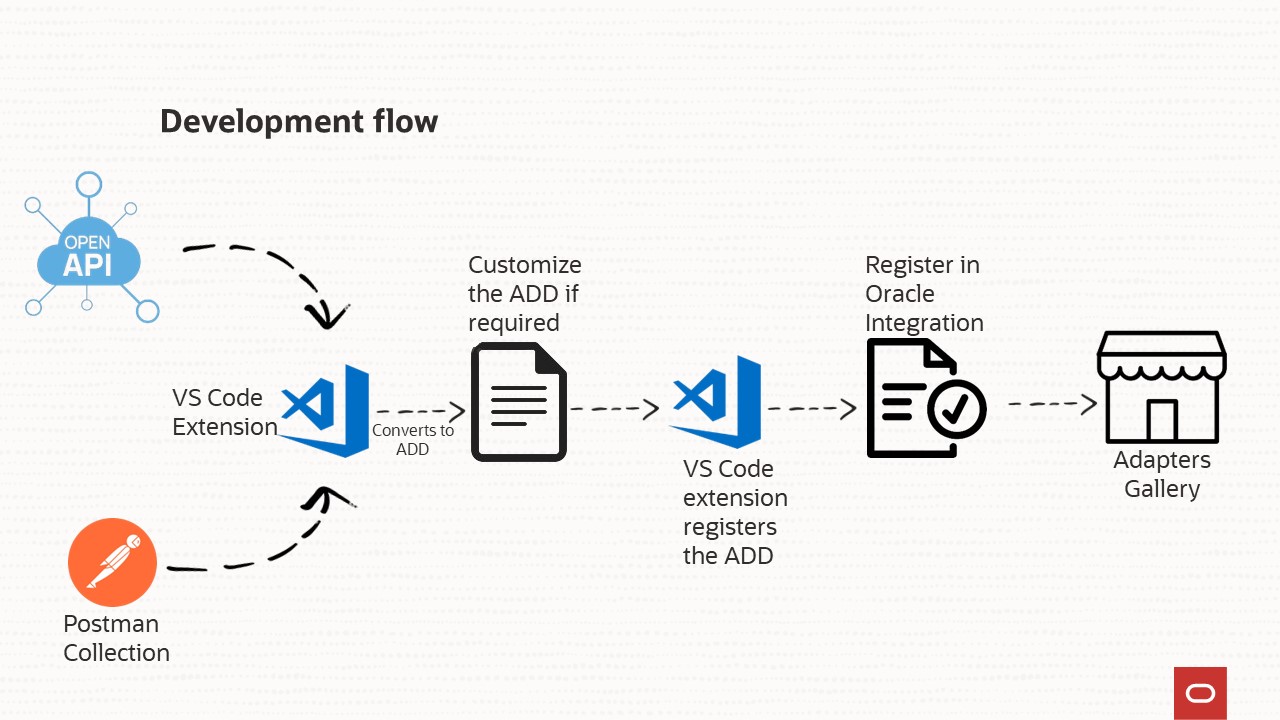
Coupa Adapter – New Adapter
The Coupa Adapter is the latest addition to Oracle Integration’s ERP category of adapters, offering simplified integration for streamlined procurement, expenses, and invoicing.
In this release, the Coupa Adapter supports outbound invoke connections with the following capabilities:
- Numerous CRUD operations for comprehensive data control
- Actions supporting Coupa Pay, Invoice, Suppliers, and Legal Entity operations
- OAuth 2.0 Client Credentials (cloud) for enhanced security
To establish a connection with the Coupa Adapter, it is imperative to provide the HostUrl, Client ID, and Client secret on the Connection page. Furthermore, when configuring the OAuth 2.0 Authorization Code Credentials security policy, you must specify a scope.
To obtain the client ID and client secret, refer to the Coupa documentation OAuth Client creation and scope assignment.
Connection Page (Invoke)

Configuration (Invoke)
Let’s now look at how to configure the Coupa Adapter invoke connection. The configuration of the invoke endpoint can be done graphically by selecting the options in the Adapter Endpoint Configuration Wizard.
Basic Info Page

In our upcoming releases, anticipate the addition of trigger support, enhancing data management through custom fields, streamlining system communication with the connectivity agent, and facilitating effortless, large-scale data transfers with bulk export and attachment capabilities.
Salesforce REST Adapter – New Adapter
The Salesforce REST Adapter is a new addition to Oracle Integration’s category of CX adapters alongside the existing Salesforce Adapter.
Why a dedicated REST-based adapter for Salesforce?
The current Salesforce Adapter has been seamlessly integrating with Salesforce using SOAP APIs under the covers for various tasks such as CRUD, SOQL, and SOSL operations on diverse business objects, and is widely used. It selectively utilizes Salesforce REST APIs for specific functionalities such as Bulk API support where SOAP APIs are not available.
Even though there is no public announcement of either the deprecation or retirement of SOAP APIs by Salesforce, we want to future-proof OIC’s ability to integrate with Salesforce. Therefore, we are introducing a new adapter called the Salesforce REST Adapter to provide almost the same set of capabilities, along with new enhancements that use Salesforce REST APIs under the cover. In addition, the Salesforce REST Adapter incorporates security best practices by removing the support for less secure authentication schemes such as Resource Owner Password Credentials Flow policy and Basic Authentication policy.
The introduction of the new Salesforce REST Adapter ensures continued support for a broad range of capabilities while incorporating enhancements that use Salesforce REST APIs under the hood. This new adapter improves performance with faster communication, reduces overhead compared to SOAP, and adopts all new features offered by Salesforce via REST APIs.
Points to be Noted:
- We will continue to support and enhance the current Salesforce Adapter wherever required, and customers can use both adapters simultaneously.
- The current Salesforce Adapter will remain supported as long as Salesforce keeps supporting SOAP APIs. This means that existing integrations will continue to function without any issues. Therefore, there is no need for existing integrations to migrate to the new Salesforce REST Adapter.
- We highly recommend using the Salesforce REST Adapter for integrating with Salesforce going forward.
Enhancements in the Salesforce REST Adapter
The Salesforce REST Adapter introduces several enhancements over its SOAP counterpart, elevating the integration experience. Some notable advantages include:
- Client Credentials Flow Policy: Introducing a secure method for client authentication.
- Simplified CRUD operations on the wizard page:
- External ID Field Selection is now available in the wizard and can pass the values dynamically from the mapper.
- All or none is now available in the mapper; it can take values dynamically.
- Advanced SOQL Support:
- Support for Field functions.
- Support for Format functions.
- Support for Five-level Parent to Child relationships for a richer query experience.
- Dynamic SOQL and SOSL Support: Providing dynamic WHERE clause support for enhanced flexibility.
- Connection page improvement: Users now do not need to mention Prod/sandbox/Gov. The Connection page takes care of auto-discovery by mentioning the domain name.
- Efficient Architecture: Being REST API-based, it maximizes the efficiency of the underlying Microservice-based architecture and minimizes the bandwidth with JSON data exchange.
Key Differences Between Salesforce REST and SOAP
Understanding the differences between SOAP and REST is essential for making informed integration decisions. Here’s a concise breakdown:
| Features |
Features Not Supported by REST |
Alternatives |
| Security Policy |
Username Password Policy ROPC (2-legged support) |
Salesforce REST APIs are not supporting less secure ROPC and Basic Authentication. Therefore, it is recommended that you use one of the other security policies:
|
| Core and Utility Operation |
Send Mass Email, Convert Lead, Merge, and Undelete |
Use DLs for Send Mass Email and use Apex REST for Convert Lead, Merge, and Undelete. |
| Apex – SOAP and REST |
Apex SOAP |
Apex REST |
| Inbound Events |
Outbound Messaging |
REST APIs are not supporting outbound messaging. Therefore, it is recommended that you use Platform Event and Change Data Capture. |
What’s on the Horizon?
The roadmap for the Salesforce REST Adapter includes exciting developments planned for future releases:
- Bulk Support: Scaling up bulk operations for even greater efficiency.
- REST API Composite Resources: A unified approach to working with resources.
- Composite Batch: Streamlining integration workflows for efficiency.
- REST API Reports and Dashboard: Seamless access to Salesforce Reports and Dashboards.
SAP SuccessFactors Adapter Enhancements – Multi-Navigation, Pagination, and Query Parameter Support
Recent enhancements to the SAP SuccessFactors Adapter in Oracle Integration prioritize multi-navigation for Search and GET operations, pagination, and query parameter support.
- Supports multi-level navigation for data retrieval, building on its existing capability.
Users can seamlessly navigate between entities using the navigation property, as demonstrated in the example query syntax:
Example: toPaymentMethodAssignmentV3/countryNav/currencyNav/statusNav.

- Enhances outbound invocations with pagination support, facilitating efficient handling of large data sets.
- Introduces new query parameters $inlinecount and CustomPageSize for additional flexibility in GET and Search operations, complementing the existing OData-compatible query options such as $expand, $select, $filter, $orderby, $top, and $skip.
Snowflake Adapter Enhancements – Internal Stage, Running SQL Statement, and Performing Operations Against Tables Support
The Snowflake Adapter introduces the following new capabilities:
- Internal stage support
- Support for executing SQL queries
- Perform operations against tables in the Snowflake database
With this enhancement, the adapter gains access to Snowflake’s internal stages for importing and exporting bulk data to and from the Snowflake database.
Internal stages provide flexibility and make loading data into the Snowflake database table easier and faster. Previously, the Snowflake Adapter could not access internal stages. Data was uploaded using external stages/external locations, wherein a cloud storage service (such as AWS, GCP, or Microsoft Azure) was used to upload the data.
The Snowflake Adapter provides the following benefits using an internal stage:
- Supports the bulk import of data into the Snowflake database using the internal stage.
- Supports the bulk export of data from the Snowflake database using the internal stage.
- Supports the operations in a synchronous process. The Check/Cancel Statement Execution action does not apply to the internal stage. Once the process is completed, the Snowflake Adapter displays a response indicating whether or not the statement was executed successfully.
The internal stage option and associated fields are introduced on the Invoke Operation page of the Adapter Endpoint Configuration Wizard.
Operations Page (Invoke)

In addition, the Snowflake Adapter extends capabilities to provide support for executing SQL queries and performing operations against tables in the Snowflake database.
The Snowflake Adapter now supports outbound invoke connections with the following capabilities:
- Support for execution of SQL queries against database tables.
- Support for performing Insert operations against database tables.
- Support for performing Update operations against database tables.
- Support for performing Insert or Update (Merge) operations against database tables.
- Support for performing a SELECT operation against database tables.
To execute simple SQL queries:
1.Select the Run a SQL Statement action on the Action page.
Action page (Invoke)

2. Enter a SQL query and review the specified adapter configuration values on the Summary page.
Operations Page (Invoke)

For performing operations against tables in the Snowflake database:
1.Select Perform an Operation On a Table on the Invoke Action page.
Action page (Invoke)

2. Select to perform one of the following operations on a table.
- Insert
- Update
- Insert or Update (Merge)
- Select
Operations page (Invoke)

If the Import Tables button is selected on the Operations page, the following subpage is displayed. Review the specified adapter configuration values on the Summary page.
Operation page (Subpage)

Azure Storage Adapter Enhancement – Blob Deletion Option
The Azure Storage Adapter now includes the capability to delete a blob after it has been downloaded from the Azure portal.
A new checkbox, Delete after download, has been introduced on the Configuration page of the Adapter Endpoint Configuration Wizard. This checkbox appears if the Get Blob action is selected on the Basic Info page.
Configuration Page (Invoke)

GCP Pub Sub Adapter Enhancement – AVRO Schema Support
The GCP Pub Sub Adapter has been enhanced to support the Avro message structure.
The adapter now enables you to subscribe to messages (inbound) and publish messages (outbound) to topics associated with the Avro schema.
Configuration Page (Trigger)

Configuration Page (Invoke)

Azure Event Grid Adapter Enhancement – Payload and Avro Schema Message Structure
The Azure Event Grid Adapter now supports the Enable payload fields option to represent the individual data elements within the payload of integration. They play a crucial role in defining how data is transferred and transformed between connected systems.
The Azure Event Grid Adapter now supports the Avro schema message structure.

Azure Service Bus Adapter Enhancement – Cloud Support
The Azure Service Bus Adapter enables you to integrate a cloud application that supports Azure Service Bus with Oracle Integration.
Connection Page
On the Connection page, a new option is introduced under Access type: Public gateway. As a prerequisite, it is required to connect to endpoints using the public internet.

HubSpot Adapter – Inbound Trigger Support
Oracle Integration introduces inbound support for the HubSpot Adapter, expanding its adapter offerings. This enhancement offers benefits such as inbound trigger support for Companies, Contacts, Deals, Line_items, Products, and Tickets for creation, deletion, and property change event. In addition, it provides authentication options using HMAC and OAuth 2.0.
Connections Page (Trigger)
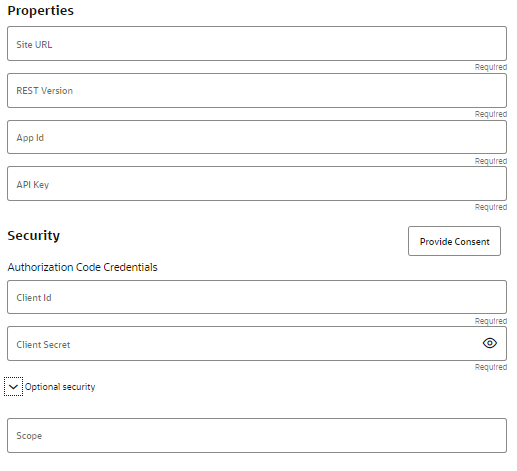
Operations Page
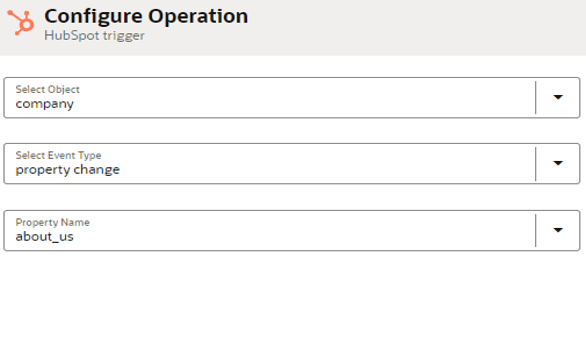
OData Adapter Enhancements – Multilevel Navigation for Modification Operations
The OData Adapter provides the following new enhancements:
- Multilevel navigation support (Deep Insert) for the Create operation.
- Client Certificate-based authorization (for cloud).
Operations Page
As an enhancement to support multilevel navigation, you can now select multiple child entities for the Create operation. Child data can be passed until the nth level, along with parent data. The user can do this by selecting the child entity available in the Request Mapper for mapping on the additional page added.


Connection Page
A new security policy has been added on the Connection page, adding to enhanced authentication and security. You must upload the certificate in the OIC Certificates page to establish a connection with the application. This is only applicable for cloud.

Azure Active Directory Enhancements – Automatic Webhook Renewal
Previously, manual renewal of an Azure AD webhook was required every 29 days to avoid breaking integrations. The adapter can now automatically renew the webhook, eliminating the need for manual intervention.
Private Endpoint Enablement for a New Set of Adapters
A new set of adapters have been enhanced to support the private endpoint type:
- Jira
- Marketo
- Shopify
- PayPal
- GraphQL
- Salesforce Commerce Cloud
- ServiceNow
- Zendesk
- OData
This functionality empowers users to establish secure connections to private resources hosted within a virtual cloud network (VCN).
To connect to private endpoints, a user must complete prerequisite tasks in the Oracle Cloud Infrastructure Console. Failure to do so results in errors when testing the connection. See Connect to Private Resources in Provisioning and Administering Oracle Integration 3 and Troubleshoot Private Endpoints in Using Integrations in Oracle Integration 3.
A new option, private endpoint, has been introduced on the Connection page for the adapters listed above.
Shopify Adapter Certified to Support New API Versions 2023-07 and 2023-10
The Shopify Adapter is certified with Shopify API versions 2023-07 and 2023-10.
Streaming API Support for the Apache Kafka and Confluent Adapters
With this release, both the Apache Kafka and Confluent Adapters are enhanced to support Streaming APIs.
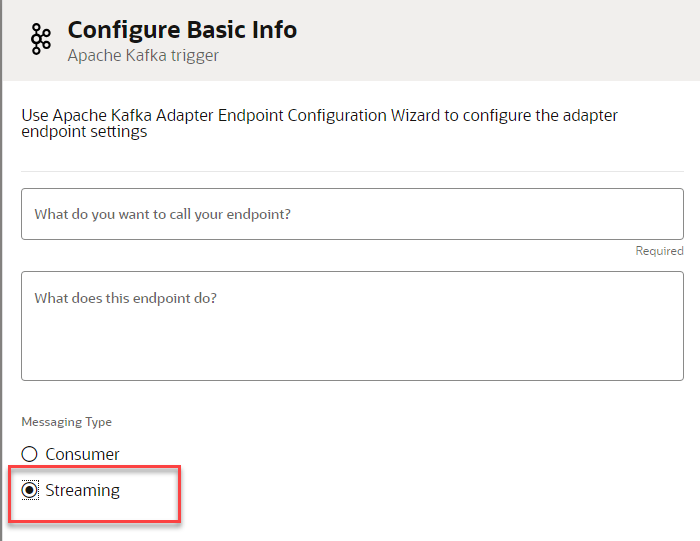
Oracle Eloqua Cloud Adapter Enhancement to Support Updating Multiple Matched Records
Oracle Eloqua Cloud Adapter has been enhanced to support updating multiple matched records in Eloqua by leveraging the Eloqua Bulk API in an invoke connection.
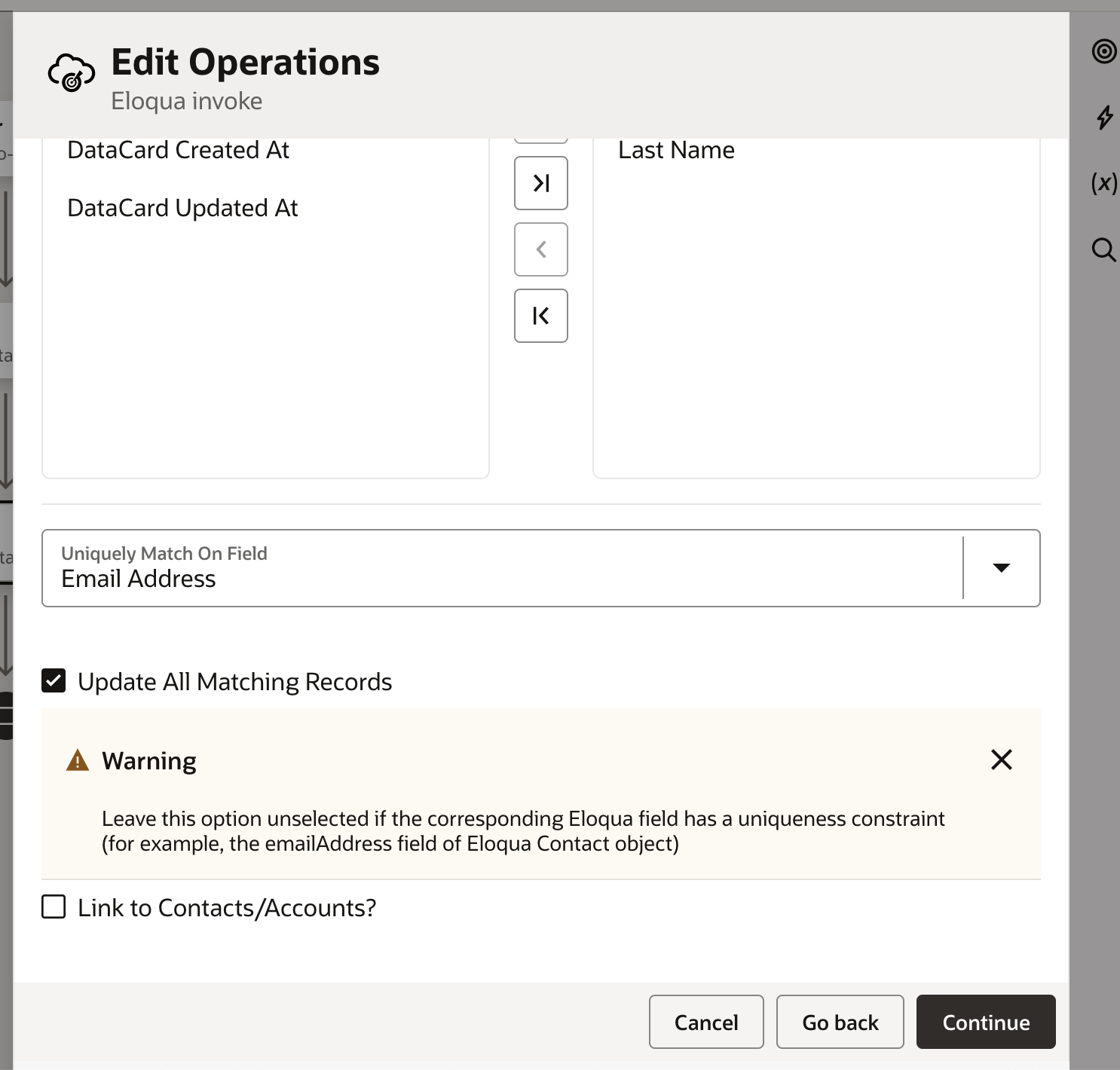
Enhanced Security Support in the FTP Adapter
OIC now supports signing and verification of data using ECdsa and EDdsa PGP keys in the FTP Adapter.
Concur Security Policy Deprecation
The Concur Resource Owner Password Credentials Policy has been deprecated by Concur. You are advised to transition to the Resource Owner Password Credentials Policy.
